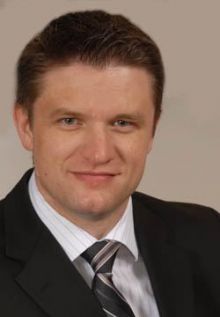A few days ago Microsoft Ukraine opened its second national Innovation Center in Kharkiv, which is supposed to acquaint Ukrainian students and teachers with the world’s best practices in IT. As recently as the early 2000s, Microsoft had doubts in the necessity of introducing of Ukrainian versions of the company’s products, as Ukrainians would just as easily use Russian versions.
These days the company’s latest products appear on the Ukrainian market almost instantly, the delay depending only on the time necessary for transportation. Moreover, there are quite a few Ukrainians among the authors of the operation systems, text editors, and a host of other products that have won international recognition.
This is far from being an optimal use of our intellectual resources though, said Dmytro SHYMKIV, CEO for Microsoft Ukraine. He shared his ideas about the true potential of the domestic IT market and the key obstacles hindering its development. He also spoke about the announcements made by Microsoft this year, as well as the company’s experience in the sphere of social responsibility.
Where is the Ukrainian market on Microsoft’s priority scale?
“This market is very interesting for Microsoft Corporation. Firstly, you have to remember that Ukraine is a 46-million strong nation. Secondly, you find a lot of software here. Ukrainians are talented specialists. We are growing some very powerful brains here.
“Ukraine is the birthplace of many innovative ideas. I would even say: it is a ‘cradle of innovations.’ It was in Ukraine that Dmitrii Mendeleev dreamt up his periodic table of chemical elements. This is also where the first powerful computer appeared, the first helicopter, the first genetic research, etc. Suffice it to say, this nation has a potential.
“However, throughout its entire history, Ukraine has never been able to profit from it. The inventors either moved abroad, or the state did not show any interest in them. That is why we must finally learn to spot ideas and implement them.
“We are currently witnessing a positive transformation of the Ukrainian IT market. In past years over 83 percent of the market was occupied by ‘hard sales’ (computers and other equipment). Today the proportion of services on the market is increasing, as in developed countries. When services increase, it involves the creation of new jobs and technologies. The economy is growing. And it is the younger generation that is the engine of this process.
“On our website, people often ask why it is still virtually impossible to find Ukrainian versions of Microsoft products in the stores. It is really depressing, because it has been several years already since Microsoft completely localized Windows and Office in Ukrainian. We also continue to localize most of our products.
“However, the sad fact is that most orders from distributors or immediate hardware manufacturers are mostly for Russian versions. Sometimes this reaches 100 percent. This is something we cannot influence. Yet, in response to a public appeal, we are initiating a dialog with our distributors, so as to ensure the availability of Ukrainian versions of Microsoft products to customers. Moreover, Ukrainian versions can be ordered on our website at any time.”
How fast can you prepare a Ukrainian version of your product?
“When a program is being designed, it is issued in languages of the so-called group 1. That is where Russian can be found. Ukrainian belongs to group 2. Localization can take up to one month. By the way, we involve the public in this process. For example, before the official launch of Windows 7, we had been monitoring the feedback on our translation, as well as suggestions.”
The high level of computer piracy in Ukraine is a whole different topic. To what extent does Microsoft fear this phenomenon? How much do you think Ukraine loses in terms of investments due to unbounded piracy?
“According to the IDC, because of the high level of piracy, Ukraine loses 100 million dollars in tax each year. This is the minimum calculation for what is installed without being purchased.
“Ukraine has virtually no business based on creative work or intellectual products. There is no system allowing to make money from intellect. As a result, we do not have wealthy artists, musicians, or engineers. Therefore, our economy is also ‘lopsided.’ I have set myself a personal goal: to do everything possible in order to see, in ten years’ time, domestic companies that will profit from brains.
“Brains should be paid for! Intellectual work is also work, like physical labor. When we, say, call in a plumber, we don’t expect him to work for nothing, do we? And we can never have a free ride in a taxi. However, unfortunately, this intellectual economic layer is still missing here.
“Ukraine is capable of creating its own products. Yet today we have to face the truth: there is not a single well-known company in this country which would be selling its products. Take Russia, for instance – it has such companies. And even the social networks used by Ukrainians were not created in Ukraine.
“Being a programer is hard intellectual labor. Just the same as being an artist, writer, musician, or filmmaker. But even today, book printing is rather dead than alive in Ukraine, and the musicians record in Russia. It is cheaper there, and intellectual work is respected. Here as soon as you finish singing a song in the studio, it appears on the Internet.
“Ukrainians are proud that our programers work as outsourcers (i.e., write programs ordered by international companies), and that Ukraine has a large outsourcing sector. But this is mere hired labor, rather than the creation of the country’s own intellectual products under its own brands. Luckily, there are some ‘islets’ in Ukraine where people work using new technological standards. It is due to them that we are involved in the creation of the most up-to-date international technologies. I think that Microsoft is about to reveal some of the secrets about the volume of its cooperation with Ukraine. However, at present I cannot say anything about it. I can only add that Ukrainians are involved. And they not just tap in the code, but also generate ideas.”
Could you provide more details about your 10-year plan? What do you see as an ideal prospect of IT market development in Ukraine? What kind of Ukraine does Microsoft envisage, at present and in the future: an outlet for its products, or a school for programers?
“I want Ukraine to become a nation which would make intellectual products and export them abroad. Working for someone is a good thing. But this is only working ‘for victuals,’ even if good, and it does not create any added value.
“To become independent, we have first to support our talents. In the meantime, the winners of our Imagine Cup often remain anonymous, even though they have some first-rate ideas. The only thing is to realize them. Ideas need investments.”
Do you think Ukraine needs a separate ministry which would develop the IT market?
“Most countries have something of this kind. There is either a ministry for communications, or informatization, or something similar. It doesn’t have to be exactly a special ministry but there has to be a separate structure with certain powers and status, directly accountable to the government, because information technologies and their development immediately influence the development of the economy.”
What innovations is Microsoft Ukraine likely to show us in 2010? Could you please tell us about the company’s projects?
“Just the other day an Innovation Center was opened in Kharkiv – a place where one can get exclusive knowledge and experience. As a rule, such centers are opened on the basis of schools of higher education which have a certain potential and are co-investors in the project. This is Ukraine’s second center. The first was opened together with the Taras Shevchenko University in Kyiv.
“On Thursday, the 4th of March, at the University of Washington, Microsoft CEO Steve Ballmer showed the world the prospect of so-called cloud calculations. It is no longer necessary to have programing software installed on your computer. You will be able to use the browser. All Microsoft products are virtually present in the cloud. You need not purchase them, it will be just enough to pay some kind of fee, depending on the time you spend working on them. However, should you wish, you can buy them.
“In May, we expect the arrival of the new Office 2010. It is a very interesting product, full of various new functions. PowerPoint, for instance, will allow you to edit or make films. This will make the installation of additional specialized software unnecessary. Also, we want to officially introduce Xbox to the Ukrainian market. At present, we are negotiating this issue with the corporation’s relevant department. Until now, there has only been an uncertified and unofficial Xbox in the country. And all the games, even those with holographic hallmarks, are pirate products. We are also looking into the question of the official introduction of Windows Phone 7 to the Ukrainian market, but this product will only be available in English.
“As to the other innovative products, I either may not yet speak about them, or even do not know about them myself.”
Bill Gates, the founder of Microsoft, has recently made an unprecedented donation of 10 billion dollars for the development of vaccines. This seems to be a new and high standard for socially responsible businesses. Will Microsoft Ukraine, as a part to the famous corporation, try to keep up with corporate standards? How hard is it to be a socially business responsible in Ukraine?
“In 2009, Microsoft, together with Bill and Melinda Gates Foundation, invested more than 55 million dollars in social projects in Ukraine. We plan to keep it up in future, too. Even in the times of economic crisis, Microsoft did not reduce its social budget. That is to say, all social projects are implemented according to the plans, regardless of the crisis. Social money has to be spent on social projects, such as Onland, centers of computer literacy IDEA, etc.
“It is not difficult. It only requires the realization of the fact that once we work here, we are part of the society. And we have to invest in this society and improve it.”
We can see a vivid example of Microsoft Ukraine’s social responsibility in the sponsorship of The Day’s traditional photography contest, which is being held for years now. Is the company going to be involved in the development of Ukrainian photography in the future too?
“Yes, it is, and we have some interesting ideas about the photo contest. Windows 7 has special themes for desktops. There are themes of ‘countries of the world,’ where each country is represented by relevant pictures. At present, we have themes for the USA, Germany, France, Poland, the Czech Republic, Russia, etc. However, there are no Ukrainian themes... Thus, we have some room for work.”








